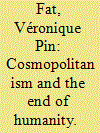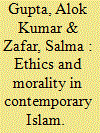| Srl | Item |
| 1 |
ID:
124422


|
|
|
|
|
| Publication |
2013.
|
| Summary/Abstract |
The academic discipline of International Relations has yet to systematically begin tracing the impact of posthumanism on ethics in global politics. In a context where a humanist picture of the subject is in "a state of crisis that is more acute than ever," and the "end of humanity" is being declared by some, the question arises as to whether a moral commitment to liberal cosmopolitanism can be maintained. It arises because the moral commitments of cosmopolitanism traditionally rest on a humanist foundation, and posthumanism, at first glance, seems an obvious threat to it. In this article, rather than reading posthumanism as a threat to humanity, I read humanism as the threat. I propose that, tricky though it may be, a cosmopolitanism that embraces the end of humanity can be formulated and defended as a moral commitment to humanity: a cosmopolitanism without foundations. This cosmopolitanism without foundations is, I suggest, one way to overcome the skeptic's fantasy that we are hidden from each other, and with it the belief that our primary relation to the world is one of knowledge anchored to foundational promises of certainty. Instead, a life lived in the world with others is proposed, and with it a cosmopolitan commitment to humanity as an unavoidable ethical responsibility.
|
|
|
|
|
|
|
|
|
|
|
|
|
|
|
|
| 2 |
ID:
145920


|
|
|
|
|
| Summary/Abstract |
Scientific temperament and technology has made deep inroads into life of human beings in twenty-first century. Human beings are adopting scientific values with the passage of time. Contemporary world is more willing to believe in scientific acts based on logical reasoning. The growth in scientific temperament among individuals has severely undermined the role of religion in life of individual and society. On the one hand religion demands unquestionable obligation of human beings and on the other hand, people still continues to believe in “luck or Kismat”. Large numbers of people despite of their scientific values continue to believe in the power of unseen forces. So, there still continues to be an overlapping between science and religion and the values attached to it.
|
|
|
|
|
|
|
|
|
|
|
|
|
|
|
|